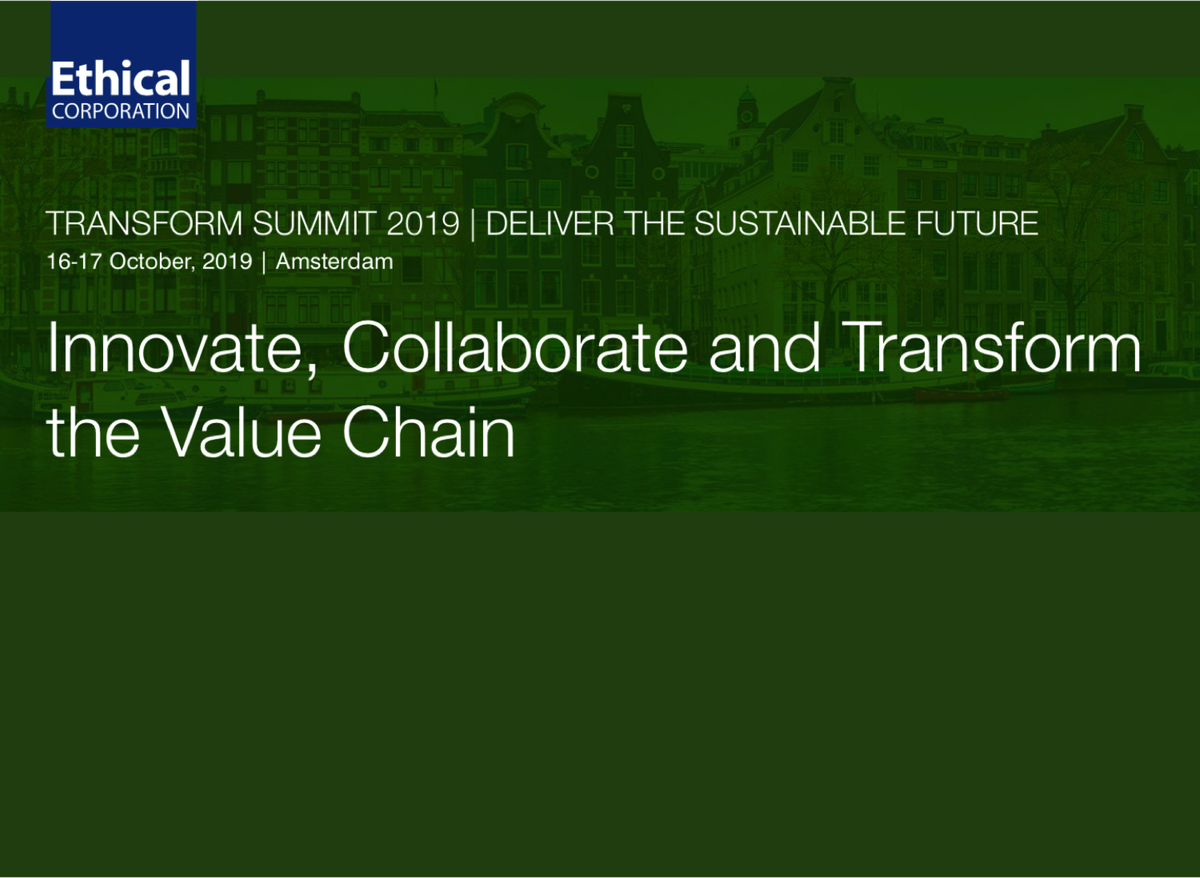Businesses on their journey to sustainability: Notes from Transform 2019
October 18, 2019

On 16-17 October 2019, the Transform Summit 2019 was organized by the Ethical Corporation. Representatives of a wide array of businesses and organisations shared their experiences and ideas on transforming to a circular economy, reducing carbon footprints, and adapting to climate change. As a media partner, the ClimateChangePost joined the summit. We summarized a couple of valuable experiences of the speakers for you.
Moving on to the real impacts
The packaging industry is changing. New packages need to be circular. At the same time the carbon footprint must be reduced and the product must still be affordable for clients. That’s the real challenge. Going from plastic to paper straws: you need the support from society to be able to make a shift.
Consumer perception and behaviour are changing. “We should take advantage of emotions”, one of the speakers said. “What moves the consumers is all about emotion.” There is much discussion on whether we should fly less, for instance. This discussion may be emotional and draw a lot of attention compared with all the other steps we need to take. It shows that people are committed to make a change, however, and this should be welcomed. By reaching out to them on these issues, you can connect them to other issues like using (too) much electricity. “There is a difference between visibility and impacts”, a speaker stressed. “Using paper instead of plastic coffee cups is visible; reducing the use of electricity is about impacts. Get people connected through visibility and then move on to the real impacts.”
Transforming the way we live
Car manufacturers are in the middle of the energy transformation. Their transformation from fossil fuel to electric is not just about transforming the way we drive, but about transforming the way we live as well. According to a spokesman from the car industry their focus is much wider than just driving a car. It’s about living and engaging with sustainable energy. A clear example is the lifetime of lithium batteries. These batteries last longer than a car, so you have to think about a second life: recover batteries from old cars and recycle them for commercial buildings, a football stadium, or a portable generator. A wider focus is also needed because people are changing. Young people want mobility; they don’t want to pay too much for a car. This calls for a different approach of car manufacturers: a switch to a service approach.
Design is everything
Recycling does not cover the essence of a circular economy; it’s much more than that. For IKEA, for instance, it's about recycling, remanufacturing, refurbishment, and reuse. IKEA’s main purpose is to prolong the life of products and materials. This can be done by designing products for reuse and repair. In fact, recycling is the last step: focus must be on reuse and repair, and products must be designed for that. “Design is everything”, a spokesman from Signify (formerly Philips Lighting) stressed. “How can you expand the lifetime of your products?”
Hidden impacts: the role of suppliers
The Paris Agreement has changed a lot for businesses. Sustainability is no longer an isolated issue in companies; it’s a fully-fledged part of businesses now. Companies cannot make the journey to sustainability on their own. They also need their suppliers for that. After all, the largest part of a company’s carbon footprint is often in the parts delivered by their suppliers. You might call this ‘the indirect emissions’ of businesses. Companies engage with their suppliers to reduce their carbon footprints and make their processes more sustainable. For this to be successful, the sources of all the components and ingredients of products must be traceable as much as possible. Not only from suppliers, but also from suppliers of suppliers, and further down the supply chain.
According to speakers on this subject, suppliers are willing to collaborate on the change agenda. The journey is not always that simple. “Start where you have a lot of influence and impact; don’t do everything at the same time”, one of them advised the audience.
Climate change is water change
“9 out of 10 climate events have to do with water. So climate change is water change”, a speaker from Coca Cola said in her opening statement. This especially holds for a company like Coca Cola. “A beverage business is a water business”, she added. She stressed the importance of adaptation and resilience with respect to climate change. Sustainability is about finding the balance between consumption and what ecosystems can offer. Adaptation and resilience are two key elements of this. Coca Cola collaborates with WWF to give water back to nature. Watershed conservation is one of the biggest commitments of the company. Focus is on replenishing water to nature and helping others to extract less.
Sustainability pays off
Sustainability is a revenue growth driver. Unilever serves as an example: less then half of Unilever brands is sustainable and these sustainable brands delivered 75% of revenue growth in 2018. There’s reason for optimism: people under the age of 40 care more than previous generations about the environment, and they represent two thirds of the world’s purchasing power.
No wonder the fastest growing brands see sustainability as a strategic item. But it is not easy to be fully sustainable. You need to go down into your supply chain and engage your suppliers to become sustainable as well. According to one of the speakers, only a very small part of company leaders has a ‘visibility beyond their own direct suppliers’.
Most important? Behaviour!
Companies can contribute a lot to the steps society has to take. But they cannot do it all by themselves. A change in the behaviour of customers is essential to make the transformation to a circular economy, to reduce carbon footprints, and to adapt to climate change. A representative of the housing industry stressed that by far most of the CO2 emissions come from their clients. “No matter what you do to make your buildings more energy efficient, and generate renewable energy on site, you still depend on the behaviour of people living in those buildings”, he added. Behaviour is more important for a successful energy transition than legislation, the speakers in the closing session agreed.








